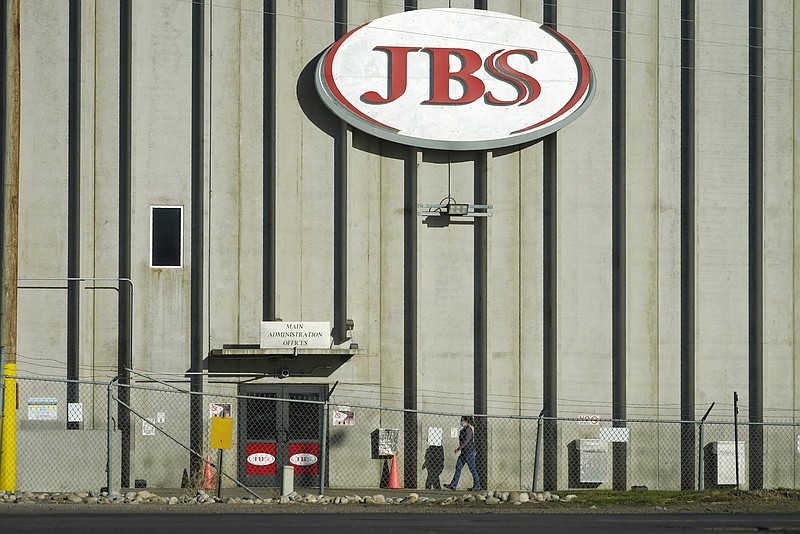DETROIT -- The world's largest meat processing company has resumed most production after a weekend cyberattack, but experts say the vulnerabilities exposed by this attack and others are far from resolved.
In a statement late Wednesday, the FBI attributed the attack on Brazil-based meat processor JBS SA to REvil, also known as Sodinokibi, a Russian-speaking gang that has made some of the largest ransomware demands on record in recent months. The FBI said it will work to bring the group to justice and it urged anyone who is the victim of a cyberattack to contact the bureau immediately.
REvil has not posted anything related to the hack on its dark web site. But that's not unusual. Ransomware syndicates as a rule don't post about attacks when they are in initial negotiations with victims -- or if the victims have paid a ransom.
In October, a REvil representative who goes by the handle "UNKN" said in an interview published online that the agriculture sector would now be a main target for the syndicate. REvil also threatened to auction off sensitive data stolen from victims who refused to pay it.
The attack targeted servers supporting JBS's operations in North America and Australia. Backup servers weren't affected and the company said it was not aware of any customer, supplier or employee data being compromised.
JBS said late Tuesday that it had made "significant progress" and expected the "vast majority" of its plants to be operating Wednesday.
It is not known if JBS paid a ransom. The company hasn't discussed it in public statements, and did not respond to phone and email messages Wednesday seeking comment.
The FBI and the White House declined to comment on the ransom. White House Press Secretary Jen Psaki said Wednesday the U.S. is considering all options in dealing with the attack.
"I can assure you that we are raising this through the highest levels of the U.S. government," she said.
Ransomware expert Allan Liska of the cybersecurity firm Recorded Future said JBS was the largest food manufacturer yet to be attacked. But he said at least 40 food companies have been targeted by hackers over the past year, including brewer Molson Coors and E & J Gallo Winery.
Food companies, Liska said, are at "about the same level of security as manufacturing and shipping. Which is to say, not very."
The attack was the second in a month on critical U.S. infrastructure. Earlier in May, hackers shut down operation of the Colonial Pipeline, the largest U.S. fuel pipeline, for nearly a week. The closure sparked long lines and panic buying at gas stations across the Southeast. Colonial Pipeline confirmed it paid $4.4 million to the hackers.
Cybersecurity experts said the attacks targeting critical sectors of the U.S. economy are evidence that industry hasn't been taking years of repeated warnings seriously.
Cybercriminals previously active in online identity theft and bank fraud moved into ransomware in the mid-2010s as programmers developed sophisticated programs that permitted the software's more efficient dissemination.
1,400 INCIDENTS
The ransomware scourge reached epidemic dimensions last year. The firm CrowdStrike observed more than 1,400 ransomware and data extortion incidents in 2020. Most targeted manufacturing, industrial, engineering and technology companies, said Adam Meyers, the company's vice president of intelligence.
"The problem has been spiraling out of control," said John Hultquist, who heads intelligence analysis at FireEye. "We're already deep into a vicious cycle."
Hultquist said ransomware syndicates are going after more critical and visible targets because they've invested heavily in identifying "whales" -- companies they think will yield big ransoms.
JBS is the second-largest producer of beef, pork and chicken in the U.S. If it were to shut down for even one day, the U.S. would lose almost a quarter of its beef-processing capacity, or the equivalent of 20,000 beef cows, according to Trey Malone, an assistant professor of agriculture at Michigan State University.
QUICK REBOOT IS KEY
Mark Jordan, who follows the meat industry as the executive director of Leap Market Analytics, said the disruption to the food supply will likely be minimal in this case. Meat has around a 14-day window to move through the market, he said. If a plant is closed for a day or two, companies can usually make up for lost production with extra shifts.
"Several plants owned by a major meatpacker going offline for a couple of days is a major headache, but it is manageable assuming it doesn't extend much beyond that," he said.
Jordan said a closure that runs closer to a week would be more serious, especially for a company like JBS, which controls around one-fifth of the country's beef, pork and chicken supply.
Critical U.S. infrastructure might be better hardened against ransomware attacks were it not for the 2012 defeat of legislation that would have set cybersecurity standards for critical industries.
The U.S. Chamber of Commerce and other business groups lobbied hard against the bill, condemning it as government interference in the free market. Even a watered-down version that would have made the standards voluntary was blocked by a Republican filibuster in the Senate.
Right now, the U.S. has no cybersecurity requirements for companies outside of the electric, nuclear and banking systems, said David White, president of the cyber risk management company Axio.
Information for this article was contributed by Rod McGuirk, Alan Suderman, Nancy Benac, Eric Tucker and Alexandra Jaffe of The Associated Press.
